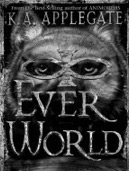Little complaints about Everworld
K.A. Applegate is best known for the Animorphs series, which we all loved for the covers depicting a series of pictures starting from a human on the left and slowly shifting into some kind of animal on the right. I scarcely believe that I'm the only one that looked forward to the monthly book fairs in elementary school just to see those ever-so beguiling covers, of course I never bought any of them (come on, there were like six hundred books in that series and my allowance at the time was two dollars weekly).
 At any rate, after the Animorphs mythos faded, Applegate moved into a new series that I have to credit with developing my own interest in literature; that series was Everworld.
At any rate, after the Animorphs mythos faded, Applegate moved into a new series that I have to credit with developing my own interest in literature; that series was Everworld.
Everworld follows the lives of four vastly different young adults. Amazingly, Applegate finds a way to emphasize their differences, but somehow avoids letting them fall into your average teenage clich�s (the jock, the prep, the nerd, the cyborg, etc.).
The series' main characters, David, April, Christopher and Jalil - all of whom have a connection to another main character, Senna - find themselves being irresistibly drawn to a park in the middle of the night where they find Senna. The five of them are drawn into some kind of portal that transports them to a place called Everworld.
Everworld is an alternate dimension created by all the mythological creatures from pretty much every culture in the world. Inversely, the denizens of Everworld refer to the real world we live in as “Oldworld.”
What makes Everworld so interesting is that it's the ultimate cultural mosaic. The protagonists find themselves on a longboat with a band of Viking raiders to go to war with Aztecs in one book, only to somehow find themselves fleeing to King Arthur's castle in the next book. Enormously different people from different time periods, geographical roots and technological abilities all interact and coexist in the same world. On top of that, Everworld is also home to Gods and creatures from all of these different mythologies.
To make the plot even more complex, there is also a race from a universe outside both Everworld and Oldworld, which is invading Everworld and going to war with all of these Gods and magical beings.
Basically, the story is about how four ordinary people get stuck in this world, and their efforts to survive and find a way out.
Each of the characters, though different, is believable. For example, one of them may want nothing more than to go home, while another is curious about his new environment, another may want to stay and help the Gods defend their world and the last just doesn't understand what's going on. This works especially with how the narrative is set up, each of the characters has their say and each is developed psychologically.
If I have one complaint, it's the ending (which I won't reveal for obvious reasons). After building up so many events and piling together so many different possible outcomes, it seems almost as if the author ran out of ideas, which is strange since she opened herself up for at least another few books. Considering how many books were in the Animorphs series, one can only speculate why she left the end of this series so inconclusive.
Regardless, this series is what fantasy should be: inventive, yet on some level believable. Even with twelve books, the story doesn't take too long to get through. It's easy to read and it's enjoyable. I haven't read any of the Animorphs books, but I can tell you that even their flashy covers don't compare to Everworld.













